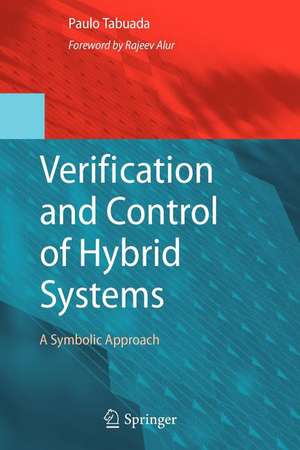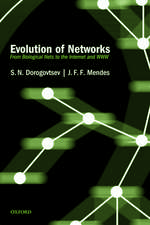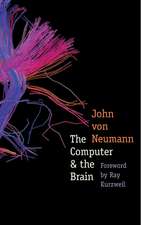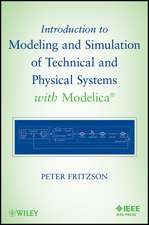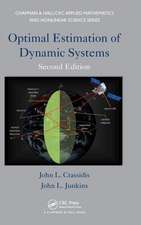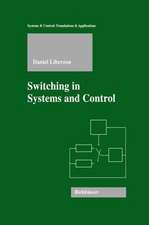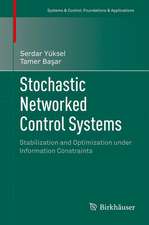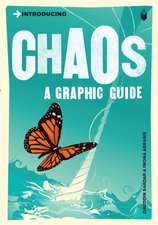Verification and Control of Hybrid Systems: A Symbolic Approach
Autor Paulo Tabuadaen Limba Engleză Paperback – 5 noi 2010
| Toate formatele și edițiile | Preț | Express |
|---|---|---|
| Paperback (1) | 777.50 lei 43-57 zile | |
| Springer Us – 5 noi 2010 | 777.50 lei 43-57 zile | |
| Hardback (1) | 783.50 lei 43-57 zile | |
| Springer Us – 15 iun 2009 | 783.50 lei 43-57 zile |
Preț: 777.50 lei
Preț vechi: 948.18 lei
-18% Nou
Puncte Express: 1166
Preț estimativ în valută:
148.82€ • 161.71$ • 125.09£
148.82€ • 161.71$ • 125.09£
Carte tipărită la comandă
Livrare economică 21 aprilie-05 mai
Preluare comenzi: 021 569.72.76
Specificații
ISBN-13: 9781441954985
ISBN-10: 1441954988
Pagini: 220
Ilustrații: XV, 202 p. 200 illus.
Dimensiuni: 155 x 235 x 12 mm
Greutate: 0.31 kg
Ediția:Softcover reprint of hardcover 1st ed. 2009
Editura: Springer Us
Colecția Springer
Locul publicării:New York, NY, United States
ISBN-10: 1441954988
Pagini: 220
Ilustrații: XV, 202 p. 200 illus.
Dimensiuni: 155 x 235 x 12 mm
Greutate: 0.31 kg
Ediția:Softcover reprint of hardcover 1st ed. 2009
Editura: Springer Us
Colecția Springer
Locul publicării:New York, NY, United States
Public țintă
ResearchCuprins
Basic concepts.- Systems.- Verifcation problems.- Control problems.- Finite systems.- Exact system relationships.- Verification.- Control.- Infinite Systems Exact symbolic models.- Exact symbolic models for verification.- Exact symbolic models for control.- Infinite Systems Approximate symbolic models.- Approximate system relationships.- Approximate symbolic models for verification.- Approximate symbolic models for control.
Recenzii
From the reviews:
“The book covers a wide range of foundational topics in verification and control of hybrid systems. … The exposition is … smooth and readable. The author is undoubtedly an excellent writer. The book may be strongly recommended to researchers who want to understand the mathematical foundations of this field.” (I. Meznik, Mathematical Reviews, Issue 2010 h)
“The rapidly growing and interdisciplinary research demands that researchers must understand concepts and tools from both computer science and control theory. This is undoubtedly a daunting task, and this is where this book can come to the rescue. It covers a wide range of foundational topics in verification and control of hybrid systems. … This book will be useful for researchers, engineers, computer scientists, and graduate students in the areas of formal methods, verification, model checking, and control.” (Alexander O. Ignatyev, Zentralblatt MATH, Vol. 1195, 2010)
“The book covers a wide range of foundational topics in verification and control of hybrid systems. … The exposition is … smooth and readable. The author is undoubtedly an excellent writer. The book may be strongly recommended to researchers who want to understand the mathematical foundations of this field.” (I. Meznik, Mathematical Reviews, Issue 2010 h)
“The rapidly growing and interdisciplinary research demands that researchers must understand concepts and tools from both computer science and control theory. This is undoubtedly a daunting task, and this is where this book can come to the rescue. It covers a wide range of foundational topics in verification and control of hybrid systems. … This book will be useful for researchers, engineers, computer scientists, and graduate students in the areas of formal methods, verification, model checking, and control.” (Alexander O. Ignatyev, Zentralblatt MATH, Vol. 1195, 2010)
Textul de pe ultima copertă
Hybrid systems describe the interaction of software, modeled by finite-state systems such as finite-state machines, with the physical world, described by infinite-state systems such as differential equations. Verification and Control of Hybrid Systems provides a unique systematic exposition of several classes of hybrid systems, admitting symbolic models along with the relationships between them. The text outlines several key verification and control synthesis results for hybrid systems, guided by the concept of bisimulation, and illustrated by numerous examples.
The book is divided into four parts:
Part I presents basic concepts centered on a notion of system that is general enough to describe finite-state, infinite-state, and hybrid systems.
Part II discusses the ways in which systems relate to other systems, such as behavioral inclusion/equivalence and simulation/bisimulation, using these relationships to study verification and control synthesis problems for finite-state systems.
Part III draws inspiration from timed automata to present several classes of hybrid systems, with richer continuous dynamics, that can be related to finite-state symbolic systems. Once such relationships are established, verification and control synthesis problems for these hybrid systems can be immediately solved by resorting to the techniques described in Part II for finite-state systems.
Part IV follows the same strategy by generalizing simulation/bisimulation relationships to approximate simulation/bisimulation relationships that can be used for a wider class of hybrid systems.
This comprehensive treatment will appeal to researchers, engineers, computer scientists, and graduate students in the areas of formal methods, verification, model checking, and control and will undoubtedly inspire further study of the specialized literature.
The book is divided into four parts:
Part I presents basic concepts centered on a notion of system that is general enough to describe finite-state, infinite-state, and hybrid systems.
Part II discusses the ways in which systems relate to other systems, such as behavioral inclusion/equivalence and simulation/bisimulation, using these relationships to study verification and control synthesis problems for finite-state systems.
Part III draws inspiration from timed automata to present several classes of hybrid systems, with richer continuous dynamics, that can be related to finite-state symbolic systems. Once such relationships are established, verification and control synthesis problems for these hybrid systems can be immediately solved by resorting to the techniques described in Part II for finite-state systems.
Part IV follows the same strategy by generalizing simulation/bisimulation relationships to approximate simulation/bisimulation relationships that can be used for a wider class of hybrid systems.
This comprehensive treatment will appeal to researchers, engineers, computer scientists, and graduate students in the areas of formal methods, verification, model checking, and control and will undoubtedly inspire further study of the specialized literature.
Caracteristici
Unified presentation of different abstraction techniques for hybrid systems Unified treatment of the notions of simulation and bisimulation across discrete, continuous and hybrid systems Thorough discussion of the recently introduced notions of approximate simulation and bisimulation for continuous and hybrid systems Illustration of the concepts through examples Includes supplementary material: sn.pub/extras
